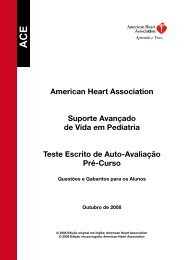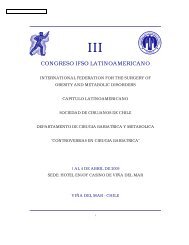Pediatric Clinics of North America - CIPERJ
Pediatric Clinics of North America - CIPERJ
Pediatric Clinics of North America - CIPERJ
You also want an ePaper? Increase the reach of your titles
YUMPU automatically turns print PDFs into web optimized ePapers that Google loves.
506 TRACY & RICE<br />
and antibodies against T-independent antigens, such as pneumococcal polysaccharides<br />
[24–26]. Natural antibodies primarily are IgM, are independent<br />
<strong>of</strong> previous immunization, bind antigens with low affinity, and limit infections<br />
before generation <strong>of</strong> specific antibody [27,28]. IgM memory B cells<br />
correspond to circulating splenic marginal zone B cells and are lacking in<br />
patients who do not have a spleen [25,29]. The absence <strong>of</strong> IgM memory<br />
B cells correlates with diminished serum antipneumococcal polysaccharide<br />
IgM antibody responses in splenectomized patients [24].<br />
The specific clinical benefits <strong>of</strong> splenic-mediated immune function are<br />
demonstrated in children who have common variable immunodeficiency<br />
(CVID), a heterogeneous immune disorder <strong>of</strong> unknown pathogenesis characterized<br />
by the inability to mount protective antibody responses in the presence<br />
<strong>of</strong> normal numbers <strong>of</strong> circulating B cells. Recent studies <strong>of</strong> CVID and<br />
related conditions have demonstrated further the critical function <strong>of</strong> splenicmediated<br />
IgM memory B cells. In these children, IgM memory B cells seem<br />
essential for prevention and control <strong>of</strong> common childhood infections, such<br />
as those <strong>of</strong> the respiratory tract caused by encapsulated bacteria [24].<br />
Memory B cells are lacking in infants and children who have CVID and<br />
in children who are asplenic. It seems, therefore, that surgical interventions<br />
for the management <strong>of</strong> HS that avoid rendering patients asplenic would<br />
have far-ranging implications not only in reducing the incidence <strong>of</strong> the<br />
rare but lethal cases <strong>of</strong> OPSI but also possibly in reducing the more common<br />
infections that affect children.<br />
Complications <strong>of</strong> total splenectomy and risks for overwhelming<br />
postsplenectomy infection<br />
Total splenectomy carries significant risks for children and adults. The<br />
most well-known and feared complication <strong>of</strong> total splenectomy is OPSI,<br />
characterized by multisystem organ failure after invasive infection with<br />
encapsulated bacteria, such as Streptococcus pneumoniae. OPSI is lethal in<br />
the majority <strong>of</strong> affected children. The risk for OPSI is higher for children<br />
compared with adults and may be as high as 20% for children who undergo<br />
splenectomy before the age 5 [3–6]. The rate <strong>of</strong> sepsis in children less than<br />
5 years <strong>of</strong> age who have undergone total splenectomy is 60-fold to 100-fold<br />
higher than for children who have not had a splenectomy [5].<br />
Although the risk for OPSI is reduced by the use <strong>of</strong> immunizations<br />
against Streptococcus pneumoniae, Neisseria meningitidis, Haemophilus influenzae<br />
type b, and postoperative antibiotic prophylaxis, its risk never is<br />
eliminated fully. Despite the frequent belief that older children and adults<br />
are not affected adversely by asplenia, patients who undergo splenectomy<br />
remain at lifelong increased risk for overwhelming infection [6,23]. The<br />
risk is compounded by the fact that vaccinations do not provide complete<br />
protection, antibiotic resistance may emerge, and poor compliance with recommended<br />
antibiotic prophylaxis <strong>of</strong>ten is observed [6,30].





